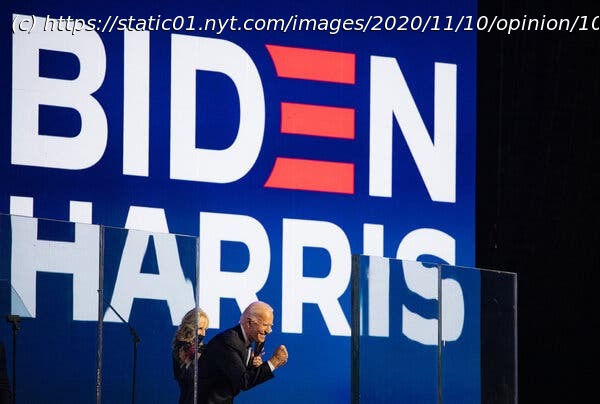It won’t be easy, but coming after a self-styled “disrupter” opens up its own possibilities.
“The People Have Chosen EMPATHY,” read the video screens flanking President-elect Joe Biden and Vice President-elect Kamala Harris during their victory speeches in a Delaware parking lot on Saturday night. They also told us that the people had chosen “UNITY” and “SCIENCE,” but they had it right the first time. Empathy — or rather, President Trump’s inability to even fake it — was what doomed him. Politically, the arrival of Covid-19 should have been a godsend to Mr. Trump, as any experienced politician would have known. A natural disaster is a leader’s meat. No one was about to blame him for a virus that originated in China. All he had to do was to make a good-faith effort to suppress it — and to show empathy. A President Trump who started each daily news conference at the height of the (now resurgent) pandemic by reading a letter from the loved one of a victim or lauding a frontline worker; a President Trump who flew into Detroit or Chicago, or even the “anarchist city” that is his native New York, with an Air Force One full of PPE; a President Trump who did everything he could to empathize with the American people and turn the medical response over to the experts, would likely have breezed to victory in last week’s election. Yet in a wider sense, the president’s inability to even fake a show of empathy hamstrung his entire administration. Mr. Trump ran and was elected as a “disrupter” president, in a long American tradition. Jefferson, Jackson, Lincoln, both Roosevelts and Ronald Reagan are previous examples of disrupters — presidents who upset the political status quo, broke up a political stalemate, resolved or at least confronted a lingering problem head on and changed the course of our country’s history. And different as the times they lived in and the problems they faced were, they all had one thing in common: an ability to empathize with Americans at a moment of confusion or crisis. Jefferson, Jackson and both Roosevelts were wealthy landowners, Reagan was a former Hollywood star, and Lincoln a well-off railroad lawyer. Yet all of them were able to at least project a populist image: Jefferson greeting the British ambassador in his bedroom slippers, Jackson the very personification of frontier toughness, Reagan a genial alternative to the scowling, Cold War conservatism of Barry Goldwater. Teddy Roosevelt, the youngest man ever to hold the office, and his adorable family entranced the nation. Franklin Roosevelt was “the only man we ever had in the White House who would understand that my boss is a son-of-a-bitch,” as a North Carolina textile mill worker once said of F.D.R. All of them had their own prejudices and hypocrisies, all of them failed or fell short at times. Yet they had more than just the common touch. They genuinely believed in what they were doing, were fully engaged in pushing the national project forward, whether or not we all agreed with what that project could or should be. They wanted to take us, ultimately, to where most Americans wanted to go. Thomas Jefferson kept America from falling apart by refusing to retaliate in kind against the partisan violations of civil liberties and limits on immigration that had been installed under John Adams. He doubled the size of the country with the Louisiana Purchase, opening up vast new territories to satisfy the restless ambitions of the yeoman farmers in whom he put his faith — though in so doing, he also started an expansion of slavery and another dispossession of Native Americans. Jackson made white, male suffrage universal, and as a military leader had already added still more territories to the United States — though he also encouraged the growth of the slave power and included an unforgivable betrayal of America’s Native American allies, one that led to the genocide of the “Trail of Tears” and nearly overthrew the power of the U.S. Supreme Court in the bargain. Lincoln ended the festering sin of slavery, even if at times he favored the idea of shipping Black people back to Africa. He passed legislation to provide land-grant colleges to the states and homesteads to the people, and flung the Transcontinental Railroad across the nation. Teddy Roosevelt pushed through the long-delayed, progressive reforms that first checked the absolute power of big business — though he embraced the fraudulent, white-supremacist theories of eugenics that were prevalent in his time, and embarked on imperialist adventures abroad. Franklin Roosevelt fundamentally changed the nature of American life, in the midst of battling the Great Depression and defeating worldwide fascism, although he also made limited progress on race and acceded to the internment of Japanese-Americans during World War II.






